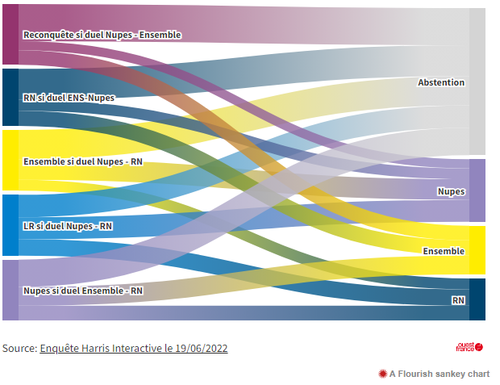
As expected, Le Pen's conservative (or in the world's of the liberal media, "Far Right") National Rally (RN) party won the first round of France's parliamentary election on Sunday, exit polls showed, but the final result will depend on several days of horsetrading before next week's run-off.
The RN was seen winning around 34% of the vote, exit polls from Ipsos, Ifop, OpinionWay and Elabe showed. That was ahead of both far-left and centrist rivals, including President Emmanuel Macron's Together alliance, whose bloc was seen winning a paltry 20.5%-23%, a far cry from his crushing victory several years ago. The New Popular Front (NFP), a hastily assembled left-wing coalition, was projected to win around 29% of the vote, the exit polls showed.
France, Ifop-Fiducial exit poll:
— Europe Elects (@EuropeElects) June 30, 2024
Snap national parliament election
RN and allies-ID: 34.2%
NFP-LEFT|G/EFA|S&D: 29.1%
Ensemble-RE: 21.5%
LR/Divers droite-EPP: 10%
Far-left candidates-*: 1.3%
➤ https://t.co/oL97q6mlTg #législatives2024 #ElectionsLegislatives2024 pic.twitter.com/VmF87HLBGH
The exit polls were in line with opinion polls ahead of the election, but provided little clarity on whether the anti-immigrant, eurosceptic RN will be able to form a government to "cohabit" with the pro-EU Macron after next Sunday's run-off.
The RN's chances of winning power next week will depend on the political dealmaking made by its rivals over the coming days. In the past, centre-right and centre-left parties have teamed up to keep the RN from power, but that dynamic, known as the "republican front," is less certain than ever.
If no candidate reaches 50% in the first round, the top two contenders automatically qualify for the second round, as well as all those with 12.5% of registered voters. In the run-off, whoever wins the most votes take the constituency.
According to Reuters, the high turnout on Sunday suggests France is heading for a record number of three-way run-offs. These generally benefit the RN much more than two-way contests, experts say.
Sure enough, the horsetrading began almost immediately on Sunday night. In a written statement to the press, Macron called on voters to rally behind candidates who are "clearly republican and democratic", which, based on his recent declarations, would exclude candidates from the RN and from the hard-left France Unbowed (LFI) party. The problem, of course, is that Macron's party was crushed in the recent European parliamentary elections precisely because the people have had enough with "clearly republican and democratic" puppets of the World Economic Forum and want actual change.
LFI leader Jean-Luc Melenchon said the second-placed NFP alliance will withdraw all its candidates who came third in the first round."Our guideline is simple and clear: not a single more vote for the National Rally," he said. It is, however, unlikely that many will care what the French socialists want: after all, last week the French socialist leftist alliance said it would raise the top marginal income tax rate to 90% if it were to take over the government.
Meanwhile, Jordan Bardella, the 28-year-old RN party president, said he was ready to be prime minister - if his party wins an absolute majority. That's right, a 28 year old kid may soon be a prime minister of the 2nd largest European economy. He has ruled out trying to form a minority government and neither Macron nor the NFP will form an alliance with him.
"I will be a "cohabitation" Prime Minister, respectful of the constitution and of the office of President of the Republic, but uncompromising about the policies we will implement," he said.
While the RN is seen winning the most seats in the National Assembly, only one of the pollsters - Elabe - had the party winning an absolute majority of 289 seats in the run-off. Experts say that seat projections after first-round votes can be highly inaccurate, and especially so in this election.
Voter participation was high compared with previous parliamentary elections, illustrating the political fervour Macron aroused with his stunning decision to call a parliamentary vote after the RN trounced his party in European Parliament elections earlier this month.
His decision plunged France into political uncertainty, sent shockwaves around Europe and prompted a sell-off of French assets on financial markets.
A longtime pariah, the RN is now closer to power than it has ever been. Le Pen has sought to clean up the image of a party known for racism and antisemitism, a tactic that has worked amid voter anger at Macron, the high cost of living and growing concerns over immigration.
At 1500 GMT, turnout was nearly 60%, compared with 39.42% two years ago - the highest comparable turnout figures since the 1986 legislative vote, Ipsos France's research director Mathieu Gallard said.
In short, the people have had enough and they finally want to be heard.
As expected, Le Pen’s conservative (or in the world’s of the liberal media, “Far Right”) National Rally (RN) party won the first round of France’s parliamentary election on Sunday, exit polls showed, but the final result will depend on several days of horsetrading before next week’s run-off.
The RN was seen winning around 34% of the vote, exit polls from Ipsos, Ifop, OpinionWay and Elabe showed. That was ahead of both far-left and centrist rivals, including President Emmanuel Macron’s Together alliance, whose bloc was seen winning a paltry 20.5%-23%, a far cry from his crushing victory several years ago. The New Popular Front (NFP), a hastily assembled left-wing coalition, was projected to win around 29% of the vote, the exit polls showed.
France, Ifop-Fiducial exit poll:
Snap national parliament election
RN and allies-ID: 34.2%
NFP-LEFT|G/EFA|S&D: 29.1%
Ensemble-RE: 21.5%
LR/Divers droite-EPP: 10%
Far-left candidates-*: 1.3%➤ https://t.co/oL97q6mlTg #législatives2024 #ElectionsLegislatives2024 pic.twitter.com/VmF87HLBGH
— Europe Elects (@EuropeElects) June 30, 2024
The exit polls were in line with opinion polls ahead of the election, but provided little clarity on whether the anti-immigrant, eurosceptic RN will be able to form a government to “cohabit” with the pro-EU Macron after next Sunday’s run-off.
The RN’s chances of winning power next week will depend on the political dealmaking made by its rivals over the coming days. In the past, centre-right and centre-left parties have teamed up to keep the RN from power, but that dynamic, known as the “republican front,” is less certain than ever.
If no candidate reaches 50% in the first round, the top two contenders automatically qualify for the second round, as well as all those with 12.5% of registered voters. In the run-off, whoever wins the most votes take the constituency.
According to Reuters, the high turnout on Sunday suggests France is heading for a record number of three-way run-offs. These generally benefit the RN much more than two-way contests, experts say.
Sure enough, the horsetrading began almost immediately on Sunday night. In a written statement to the press, Macron called on voters to rally behind candidates who are “clearly republican and democratic”, which, based on his recent declarations, would exclude candidates from the RN and from the hard-left France Unbowed (LFI) party. The problem, of course, is that Macron’s party was crushed in the recent European parliamentary elections precisely because the people have had enough with “clearly republican and democratic” puppets of the World Economic Forum and want actual change.
LFI leader Jean-Luc Melenchon said the second-placed NFP alliance will withdraw all its candidates who came third in the first round.”Our guideline is simple and clear: not a single more vote for the National Rally,” he said. It is, however, unlikely that many will care what the French socialists want: after all, last week the French socialist leftist alliance said it would raise the top marginal income tax rate to 90% if it were to take over the government.
Meanwhile, Jordan Bardella, the 28-year-old RN party president, said he was ready to be prime minister – if his party wins an absolute majority. That’s right, a 28 year old kid may soon be a prime minister of the 2nd largest European economy. He has ruled out trying to form a minority government and neither Macron nor the NFP will form an alliance with him.
“I will be a “cohabitation” Prime Minister, respectful of the constitution and of the office of President of the Republic, but uncompromising about the policies we will implement,” he said.
While the RN is seen winning the most seats in the National Assembly, only one of the pollsters – Elabe – had the party winning an absolute majority of 289 seats in the run-off. Experts say that seat projections after first-round votes can be highly inaccurate, and especially so in this election.
Voter participation was high compared with previous parliamentary elections, illustrating the political fervour Macron aroused with his stunning decision to call a parliamentary vote after the RN trounced his party in European Parliament elections earlier this month.
His decision plunged France into political uncertainty, sent shockwaves around Europe and prompted a sell-off of French assets on financial markets.
A longtime pariah, the RN is now closer to power than it has ever been. Le Pen has sought to clean up the image of a party known for racism and antisemitism, a tactic that has worked amid voter anger at Macron, the high cost of living and growing concerns over immigration.
At 1500 GMT, turnout was nearly 60%, compared with 39.42% two years ago – the highest comparable turnout figures since the 1986 legislative vote, Ipsos France’s research director Mathieu Gallard said.
In short, the people have had enough and they finally want to be heard.
Loading…





